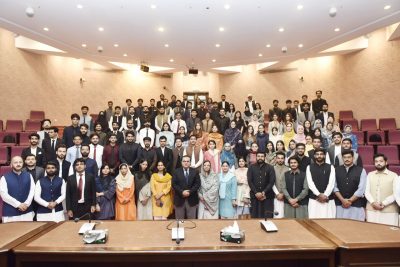
The Pakistan Institute for Parliamentary Services (PIPS), a national centre of excellence in parliamentary development, successfully conducted a five-day Orientation Workshop for the first batch of interns of the National Assembly of Pakistan from June 23rd to 27th, 2025, at its Islamabad campus. This initiative was designed to provide young interns with a comprehensive introduction to the workings of Parliament and democratic governance, preparing them for meaningful contributions during their internship tenure.
The orientation was structured to bridge the knowledge gap between aspiring professionals and legislative processes. The programme combined theoretical understanding with practical insights, delivered by a wide array of distinguished resource persons, including Members of Parliament, senior civil servants, parliamentary experts, and academics. The sessions were thoughtfully curated to develop interns’ understanding of constitutional governance, legislative processes, oversight tools, and their role as young citizens in a democratic state.
The first day began with registration, followed by an introductory briefing by the Parliamentary Development Programme (PDP) Wing of PIPS. The interns were provided an overview of the programme objectives, expected outcomes, and a detailed agenda of the workshop. The opening session, led by Muhammad Mushtaq, Advisor on Legislation at the National Assembly Secretariat, explored the structure, powers, and procedures of Parliament. He shared insights into parliamentary responsibilities, the committee system, and how the legislature shapes public policy. This was followed by an engaging session on the Constitution of Pakistan delivered by Muhammad Rashid Mafzool Zaka, Director General (Research), PIPS, who connected constitutional principles with real-world challenges in governance.
The third session of the day was conducted by Ms. Rabeea Anwar, Additional Secretary at the Senate Secretariat, who provided an overview of the Rules of Procedure and Conduct of Business, helping interns understand the legislative calendar, motions, questions, and voting procedures. The day concluded with a thought-provoking lecture by Prof. Dr. Farooq Ahmed Dar from Quaid-i-Azam University on the historical evolution of democracy. His presentation highlighted the global trajectory of democratic development and Pakistan’s own democratic journey through different regimes.
Day two focused on democratic structures and citizen engagement. Parliamentary expert Zafarullah Khan explained the federal framework of Pakistan, identifying key constitutional provisions and the role of provinces in maintaining a cohesive federation. This was followed by a session by Syed Shamoon Hashmi, Special Secretary, National Assembly Secretariat, who spoke on the changing landscape of democracy. He encouraged interns to see themselves as stewards of democratic values, able to recognize both the challenges and the potential of democratic renewal. Ms. Rabeea Anwar returned to lead a session on parliamentary oversight tools, detailing mechanisms such as questions, motions, and standing committees that enable Parliament to monitor executive action.
In the final session of day two, Member National Assembly Sher Ali Arbab led an interactive session on youth engagement in the digital era. He emphasized the importance of civic participation and ethical digital behavior, especially in a time of rapid technological advancement. His candid conversation with the interns provided a unique opportunity to discuss challenges and aspirations from a youth-centered perspective.
Day three began with a detailed walkthrough of the legislative process by Muhammad Mushtaq, offering insights into the journey from bill to law, committee stages, public consultation, and final passage. Later, Usman Zafar, Safe Digital Environment Specialist from UNDP, delivered a session on the opportunities and risks posed by artificial intelligence, equipping participants with tools to navigate technological advancements critically and responsibly.
The post-lunch session began with a talk on gender mainstreaming by Honourable Dr. Nafisa Shah, Member National Assembly, who discussed the importance of integrating gender perspectives into legislation and governance. The final session of the day was conducted by Haider Abbas, Director General (Finance and Administration) at NAVTTC, who explained budgetary processes and key financial indicators, enabling interns to understand the economic context in which legislative decisions are made.
Day four emphasized the balance of powers and the importance of fact-based communication. Senator Farhatullah Babar delivered an insightful presentation on the trichotomy of power in Pakistan, explaining the theoretical and practical boundaries between the legislative, executive, and judiciary. Usman Zafar returned for a second session on the use of social media and the dangers of misinformation, urging interns to act responsibly in the digital space. Later in the day, Nighat Paristan, Director Research at the National Assembly Secretariat, offered a practical overview of the parliamentary research process and shared how research contributes to effective lawmaking. The day concluded with a session by Nighat Siddique, Additional Secretary at the Election Commission of Pakistan, who explained citizen participation and the electoral process, emphasizing the importance of staying informed and connected with Parliament.
The final day opened with a case study on pro-people legislation. Honourable Sharmila Farooqi, MNA, presented the Age of Consent Bill and discussed its policy relevance and impact on social welfare. Dr. Muhammad Fahd Amin from Quaid-i-Azam University moderated the session, helping interns reflect on the broader legislative process. This was followed by a session on parliamentary forums and outreach, facilitated by Danish Ali Bhutto, Deputy Director National Assembly Secretariat. The session highlighted institutional efforts to bridge Parliament and civil society.
After lunch and Friday prayers, the interns participated in a closing session titled “Bridging the Gap,” where they engaged in candid discussions with Members of Parliament Shaza Fatima Khawaja and Romina Khursheed Alam. The Parliamentarians shared personal experiences and responded to questions, offering inspiration and mentorship to the next generation of leaders.
The programme concluded with a group photograph and a formal closing. Participants appreciated the breadth and depth of the sessions and expressed a strong interest in continued civic engagement. The Orientation Workshop reinforced the role of PIPS in preparing youth for leadership, encouraging democratic awareness, and contributing to Pakistan’s institutional development.